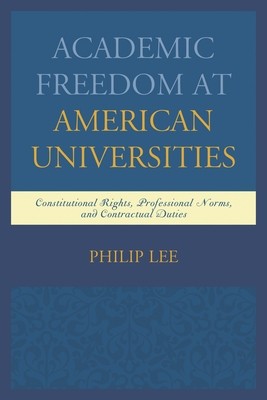
- We will send in 10–14 business days.
- Author: Philip Lee
- Publisher: Lexington Books
- ISBN-10: 1498501028
- ISBN-13: 9781498501026
- Format: 15.2 x 22.6 x 1.3 cm, minkšti viršeliai
- Language: English
- SAVE -10% with code: EXTRA
Reviews
Description
This book details the legal and historical development of institutional and professorial academic freedoms to better understand the relationship between these concepts. While some judges and scholars have focused on the divergence of these protections, this book articulates an aligned theory that brings both the professorial and institutional theories together. It argues that while constitutionally based academic freedom does its job in protecting both public and private universities from excessive state interference, or at the very least it asks the right questions, it is inadequate because it fails to protect many individual professors in the same way. This solution entails using contract law to fill in the gaps that constitutional law leaves open in regard to protecting individual professors. Contract law is an effective alternative to constitutional law for three reasons. First, unlike constitutional law, it covers professors at both public and private universities. Second, it allows for the consideration of the custom and usage of the academic community as either express or implied contract terms in resolving disputes between universities and professors. Third, contract law enables courts to structure remedies that take into account the specific campus contexts that give rise to various disputes instead of crafting broad remedies that may ill fit certain campus environments. The proposed reconceptualization of academic freedom merges constitutional protection for institutions and contractual protection for individual professors. This combined approach would provide a more comprehensive framework than is currently available under the predominantly constitutional paradigm of academic freedom.
EXTRA 10 % discount with code: EXTRA
The promotion ends in 22d.22:21:23
The discount code is valid when purchasing from 10 €. Discounts do not stack.
- Author: Philip Lee
- Publisher: Lexington Books
- ISBN-10: 1498501028
- ISBN-13: 9781498501026
- Format: 15.2 x 22.6 x 1.3 cm, minkšti viršeliai
- Language: English English
This book details the legal and historical development of institutional and professorial academic freedoms to better understand the relationship between these concepts. While some judges and scholars have focused on the divergence of these protections, this book articulates an aligned theory that brings both the professorial and institutional theories together. It argues that while constitutionally based academic freedom does its job in protecting both public and private universities from excessive state interference, or at the very least it asks the right questions, it is inadequate because it fails to protect many individual professors in the same way. This solution entails using contract law to fill in the gaps that constitutional law leaves open in regard to protecting individual professors. Contract law is an effective alternative to constitutional law for three reasons. First, unlike constitutional law, it covers professors at both public and private universities. Second, it allows for the consideration of the custom and usage of the academic community as either express or implied contract terms in resolving disputes between universities and professors. Third, contract law enables courts to structure remedies that take into account the specific campus contexts that give rise to various disputes instead of crafting broad remedies that may ill fit certain campus environments. The proposed reconceptualization of academic freedom merges constitutional protection for institutions and contractual protection for individual professors. This combined approach would provide a more comprehensive framework than is currently available under the predominantly constitutional paradigm of academic freedom.


Reviews